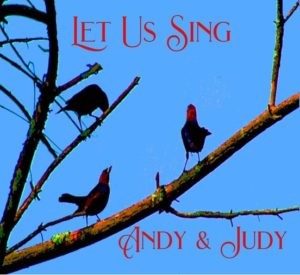 Andy Daigle and Judy Daigle, commonly known by their duo name, Andy & Judy, will be releasing another of their fine folk albums, Let Us Sing, on June 1st. The woven vocal harmonies and acoustic instruments this duo is known for are all here on Let Us Sing. It’s a treasure of an album for its intricacies of notes and vocals as well as for the undeniable emotive quality of Andy & Judy’s lyrics.
Andy Daigle and Judy Daigle, commonly known by their duo name, Andy & Judy, will be releasing another of their fine folk albums, Let Us Sing, on June 1st. The woven vocal harmonies and acoustic instruments this duo is known for are all here on Let Us Sing. It’s a treasure of an album for its intricacies of notes and vocals as well as for the undeniable emotive quality of Andy & Judy’s lyrics.
“Like A Tree” opens this disc with its running spring of acoustic guitar, banjo, and folksy harmony vocals. Judy Daigle carries the lead vocal duties with an even approach, lightly riding the lilt in the lines created by the acoustic instruments. This gives the song a backbone that maintains its allure until its basic chorus adds further draw, something extra that, too, draws the ear.
“Blue Ridge” finds Andy Daigle singing in a traditional format. This song could have been written 200 years ago. It’s unpretentious, singing of a place where one might like to settle. Plucky notes from acoustic guitar, banjo, and dulcimer creates an old Americana vibe. John Zaia’s bass adds to the pluck while his violin gives it a layer of hope as the other instruments forge a feeling of determination, pioneering one’s way forward.
Judy Daigle’s song about her father, “What It Takes To Be A Man,” describes the simple life of a hard working family man. Judy Daigle’s lead vocal truly expresses her admiration and awe with a steady vocal, a few well placed sustains, something that matches the bowed eloquence of Zaia’s violin. Jim Carey’s spoken words enhances the unaffected character this song is about. Hard work, truthfulness, and dedication are in the determination of these players as they weld its subject matter to their accompaniment.
Judy Daigle’s “County Road 5” rolls along a merry path. Its tumble weed of guitar, mandolin, banjo, and upright bass carry Judy Daigle’s voice through this reverie. Her voice, remarkably restrained, delivers a purposeful run of teenage memories. Her penchant for nostalgic songwriting comes to strong fruition here, offering details of her life on this road before returning to a simple yet heartfelt chorus.
Andy Daigle’s humor laden “Cabin On The Bayou” gets a Cajun flavor from his washboard and his Cajon. Mandolin, harmonica, and violin, too, help carry the old Louisiana melodies and vibe that color this tune so well. The couple’s harmony vocals make it feel as personable as a campfire sing along as they load it up with images of an easygoing life in this geographic area.
“There’s Freedom In Hope,” penned by Judy Daigle, feels a bit like an old spiritual number. There is a gospel flavor in the way Judy Daigle sings it with warmth and enthusiasm. Flinty banjo and persistent percussion makes it feel like a march forward, and Judy Daigle’s chorus “There’s freedom in hope” paint this in gloriously bright broad strokes.
A travel song,” Massachusetts” describes Judy Daigle’s love for her home state with a heartfelt yet understated vocal. It’s amazing how much emotion she can put into a song while maintaining a low key folk music approach. Every little coo and sustain reveals heart and soul, unfurling her message above Andy Daigle’s rootsie banjo and bluesy harmonica.
Speaking of Andy Daigle’s harmonica, he coats Judy Daigle’s “I’ll Be Your Umbrella” with a sweet, lilting melody. His amicable line accompanies Judy Daigle’s purposeful, adorned vocal. There is as much brightness in the supportive harp tenderness as there is in the voice when it briefly shifts dynamics, range. The two create the perfect mood here, conjuring an image of two lonely souls walking down a rainy sidewalk together.
Judy Daigle‘s ode to Pete Seeger, “What Would Pete Do?” lets her, with some help from technology, showcase what she can do as a backing vocalist to her own lead vocal. She creates a warm, endearing harmony. That vocal work contrasts brilliantly with a flinty banjo. Judy Daigle also manages to highlight how Seeger would have been able to get his own message home, despite changes in technology, and how he would continue to change people’s lives with his words and music.
Andy Daigle’s compassionate tribute to those who had worked in the “St. Paul Mine” gets plenty of flinty support from guitar, banjo, and mandolin. Those little gritty notes leaves open a wide space for Andy Daigle to fill in emotive lyrics. His descriptions of the shafts, the flames, and the perishing men are best expressed in plain, unadorned language and an understated delivery. Andy Daigle’s own special sensitivity is what brings this protest song to three dimensional life.
“The Well’s Run Dry,” a tale of lost love, pours its heart out. Judy Daigle’s vocal is traced with sorrow while being supported by mournful, forlorn acoustic instruments. Yet, the free flowing roll of acoustic notes and Daigle’s continuous lament imply that there is a new landscape to travel to despite the downtrodden lyrics.
Andy and Judy Daigle close out with their title track “Let Us Sing.” A gentle tune, the harmonies are warmly sung and beautifully expressed. While it feels like a goodbye for now tune, it does manage to include those numerous little notes the Daigles’ like to play that make all of the songs on this CD stand out.
Andy and Judy just keep coming up with these gems. This new Let Us Sing disc features many of their wise songwriter choices, especially in regards to the support players and which acoustic instrument to use per song. Recorded and mixed at Cherry Bridge Recording in Bridgewater, Massachusetts, Let Us Sing is another likable folk album from these dye in the wool folk artists.

